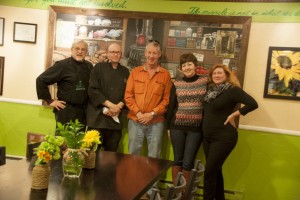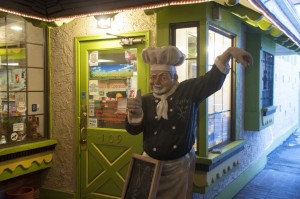Tucked away behind Josh and John’s on Pikes Peak Avenue, Seeds Community Café is about bridging gaps, communication, and establishing connections.
Since its opening in 2013, Seeds has already won multiple awards.
“To tell Seeds’ history, you probably have to talk a little bit about my history,” founder Lyn Harwell said.
Harwell was raised in a close-knit farming community in Ohio: “We took care of each other,” said Harwell. “We shared successes, and when we had issues, we embraced each other. And we did this over meals.”
“All the stuff that we call organic food today we just called food when I grew up,” Harwell said. “But since the introduction of premade meals and TV dinners, have lost this shared sense of community and we have lost our connection with our food.”
“Food is vital to our existence; it’s medicine,” said Harwell. “Every great book has stories around food. Powerful decisions are made around food, and there is power in economics.”
Only 7 percent of the food in Colorado Springs grocery stores is local to Colorado. That means that if Colorado stops importing food, Colorado will only have a three-day supply of food in our grocery stores. This practice pulls money out of our communities. In response to this problem, Seeds takes pride in being locally sourced; last year, almost 80 percent of their food came from Colorado.
 One of Harwell’s greatest frustrations is the lack of healthy food and the lack of education around it. This, along with the ideals he learned from his childhood home, is what spurred the founding of Seeds.
One of Harwell’s greatest frustrations is the lack of healthy food and the lack of education around it. This, along with the ideals he learned from his childhood home, is what spurred the founding of Seeds.
After reading an article about the first “pay-what-you-can” community café in Salt Lake City, Harwell contacted the creator, Denise Cerreta, and brought her out to Colorado Springs to help jump-start the planning process of Seeds.
What makes Seeds so unique is that there are no set prices. There is a suggested donation, but what people actually pay varies. And if they can’t pay, Seeds asks that they donate an hour of service. However, there are plenty of volunteers that offer their time to Seeds simply because they believe in what Seeds does.
“It’s a great leveler,” Harwell explained. “You could have the richest person in Colorado Springs here, and you could have the poorest, and they could be at the same table.”
Because no one knows what anyone else pays, it removes a lot of the socioeconomic status and allows for communication to arise that wouldn’t necessarily be possible at a normal restaurant. “Someone could overhear a conversation that changes their lives,” said Harwell.
 “We have bruised people and bruised food in America, and we waste both of them,” said Harwell. “We need to bring them together to change that… We can help empower [these people] to own their lives again.” By establishing a system that reuses and recycles food, we can eliminate waste while creating jobs and adding economy to local communities.
“We have bruised people and bruised food in America, and we waste both of them,” said Harwell. “We need to bring them together to change that… We can help empower [these people] to own their lives again.” By establishing a system that reuses and recycles food, we can eliminate waste while creating jobs and adding economy to local communities.
Seeds has partnered with Pikes Peak Community College to do just that. Together, they teach culinary arts and source jobs to those considered “high-risk” employment. The program trains its participants in what Lyn calls the hard skills of culinary arts as well as the soft skills, like effective communication and how to “work the head and the heart” to secure a stable job.
“When they come to the café, there is a sense of security and peacefulness,” explained Harwell. “They can start to discover who they are and what things might have caused them to lose jobs in the past.” In Seeds’ first full year, these programs put 16 people back to work with living wage jobs and added a half a million dollars into our local economy.
These aren’t hand-outs, but hand-ups. By teaching people real-life job skills and how to sustainably cook for themselves, they use their own power to lift themselves up. From there, it’s a domino effect.
In terms of future plans, Harwell is dreaming big. One of his ideas includes a collaborative of multiple non-profits housed in one large building. “Imagine a kitchen where we bring rescued food, take people off the food stamp line, and put them on a food production line and give them jobs,” said Harwell. The rescued food will be turned back into healthy food products and meals, which can then be sold at a discounted price to programs such as Meals on Wheels or schools.
But what else can we do? “Talk to people,” Harwell said. Join a food rescue, teach people how to cook sustainably and healthily, donate money and food, and simply raise awareness. If you’re interested in working with these and similar issues through Colorado College, you can get involved with Mobile Meals and the Ponderosa Project.
Tara Labovich
Latest posts by Tara Labovich (see all)
- CC’s Fashion Show: Rubber Ducks and Safety Pins – Apr 29, 2016
- Bluegrass Ensembles Gain Valuable Experience at Durango Meltdown – Apr 26, 2016
- Mountains, Whiskey, and Heartbreak: Bluegrass at Colorado College – Mar 6, 2016
